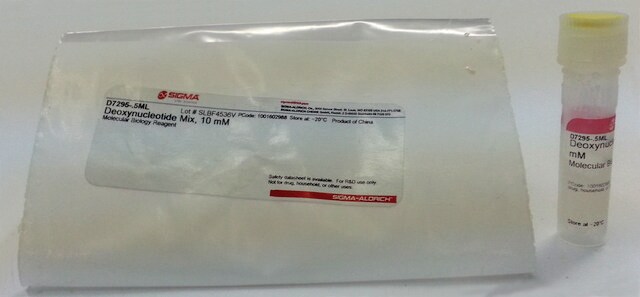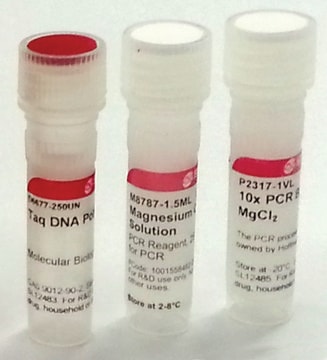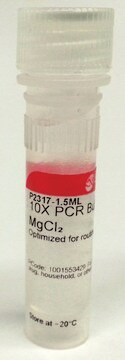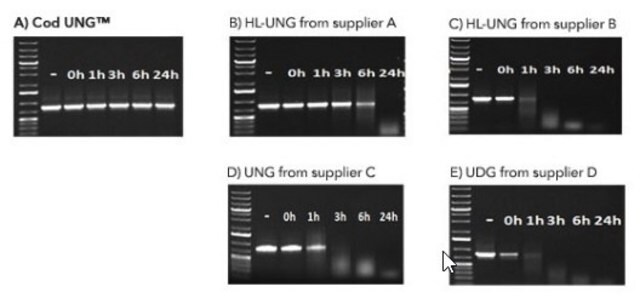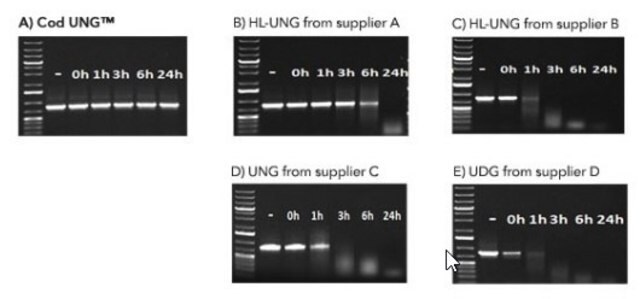SRE0113
Bst Max DNA Polymerase
recombinant, expressed in E. coli, Salt and Inhibitor Tolerant
Sinónimos:
Bst DNA polymerase, Isothermal DNA Polymerase
Iniciar sesiónpara Ver la Fijación de precios por contrato y de la organización
About This Item
UNSPSC Code:
12352200
NACRES:
NA.54
Productos recomendados
recombinant
expressed in E. coli
Quality Level
specific activity
40,000 U/mg
feature
Salt and Inhibitor Tolerant
optimum pH
8.5
shipped in
dry ice
storage temp.
−20°C
General description
Loop-mediated isothermal amplification (LAMP) has emerged as a key alternative to polymerase chain reaction (PCR)-based techniques in the amplification of nucleic acids. While conventional PCR employs a thermal cycler for repetitive cycling temperatures when amplifying, isothermal amplification techniques such as LAMP occur at a single and fixed temperature allowing the use of simple, portable, and more robust instruments for fast and exponential amplification.
The Bst Max DNA polymerase is an in-silicon designed homolog of Bst DNA Polymerase (large fragment) suitable for DNA amplification at elevated temperatures with an optimum of 65°C. Bst Max DNA polymerase is a salt-tolerant recombinant polymerase (optimal salt concentration 50-350 mM) with more than two-fold enhanced strand-displacement activity and processivity when compared to Bst polymerase. The Bst enzyme is active from 25 to 65°C. It lacks 5’-3’- and 3’-5’-exonuclease activity.
The Bst Max DNA polymerase is an in-silicon designed homolog of Bst DNA Polymerase (large fragment) suitable for DNA amplification at elevated temperatures with an optimum of 65°C. Bst Max DNA polymerase is a salt-tolerant recombinant polymerase (optimal salt concentration 50-350 mM) with more than two-fold enhanced strand-displacement activity and processivity when compared to Bst polymerase. The Bst enzyme is active from 25 to 65°C. It lacks 5’-3’- and 3’-5’-exonuclease activity.
Application
Bst Max DNA Polymerase is
- Ideal for isothermal applications such as LAMP and RT-LAMP for its superior amplification performance and robustness, especially at point-of-care diagnostics
- Compatible with a wide range of buffer formulations and isothermal applications such as Ramification amplification (RAM), NEMA (Nicking enyzme-mediated amplification), HAD (Helicase-dependent amplification), MDA/SDA (Multiple/Strand displacement amplification), RCA (Rolling circle amplification), RPA (Recombinase Polymerase amplification)
Features and Benefits
- Efficient strand displacement activity allows the polymerase to amplify at a faster rate while displacing the second DNA strand during synthesis.
- High processivity ensures that the polymerase can amplify more nucleotides consecutively without dissociation from the DNA template
- Higher salt and inhibitor tolerance ensures enhanced amplification performance without the need for sample prep steps
- Ideal for amplification of most sample types, especially small and impure samples
- Triton-free formulation complies with the European Chemicals Agency’s REACH regulations to improve the protection of human health and the environment from risks that can be posed by chemicals
Unit Definition
One unit is defined as the amount of enzyme that will incorporate 10 nmol of dNTP into acid insoluble material in 30 minutes at 65°C.
Reconstitution
In solution.
Other Notes
Order primers for LAMP using our online configurator. For assistance with primer design prior to purchase, please use the online design tool from our partner.
Related product
Referencia del producto
Descripción
Precios
Storage Class
12 - Non Combustible Liquids
wgk_germany
WGK 1
flash_point_f
Not applicable
flash_point_c
Not applicable
Elija entre una de las versiones más recientes:
Certificados de análisis (COA)
Lot/Batch Number
Lo sentimos, en este momento no disponemos de COAs para este producto en línea.
Si necesita más asistencia, póngase en contacto con Atención al cliente
¿Ya tiene este producto?
Encuentre la documentación para los productos que ha comprado recientemente en la Biblioteca de documentos.
Nuestro equipo de científicos tiene experiencia en todas las áreas de investigación: Ciencias de la vida, Ciencia de los materiales, Síntesis química, Cromatografía, Analítica y muchas otras.
Póngase en contacto con el Servicio técnico
